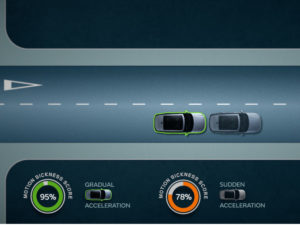Autonomous vehicles will be programmed to drive in a way that reduces the impact of motion sickness
Jaguar Land Rover is pioneering software that will reduce motion sickness by adapting the driving style of future autonomous vehicles, to continue to provide our customers with the most refined and comfortable ride possible.

During the first phase of the project, a personalized ‘wellness score’ was developed which could reduce the impact of motion sickness by up to 60%.
The intelligent software combines 20,000 real-world and virtually-simulated test miles to calculate a set of parameters for driving dynamics to be rated against.
This technology can then be used to teach each Jaguar and Land Rover vehicle how to drive autonomously, while maintaining the individual characteristics of each model.
As a result of the project, engineers are now able to develop more refined advanced driver-assistance systems (ADAS) features on future Jaguar and Land Rover models, such as adaptive cruise control and lane monitoring systems.
“Solving the problem of motion sickness in driverless cars is the key to unlocking the huge potential of this technology for passengers, who will be able to use the travelling time for reading, working or relaxing,” explained Dr Steve Iley, Chief Medical Officer, Jaguar Land Rover.
This is another step for Jaguar Land Rover on its journey to Destination Zero: an ambition to make our societies safer and healthier and our environments cleaner through relentless innovation.
With the mission of raising the quality of future urban living, Jaguar Land Rover has also revealed ‘Project Vector’ an advanced autonomy-ready concept for future mobility.
